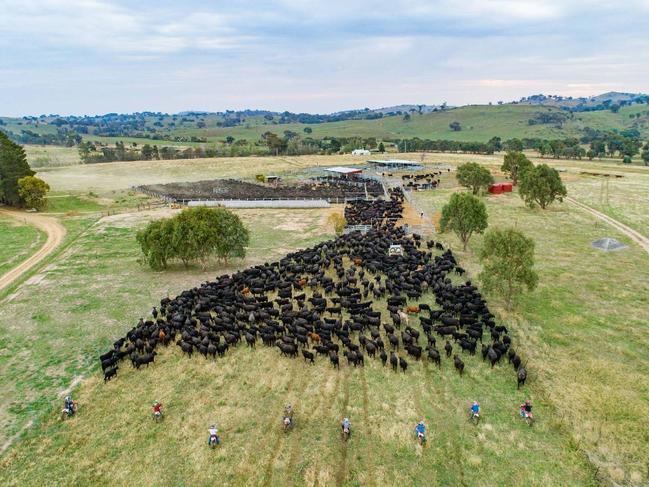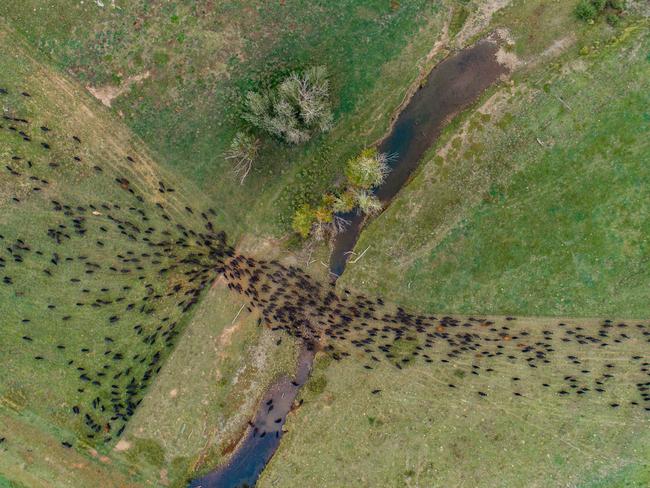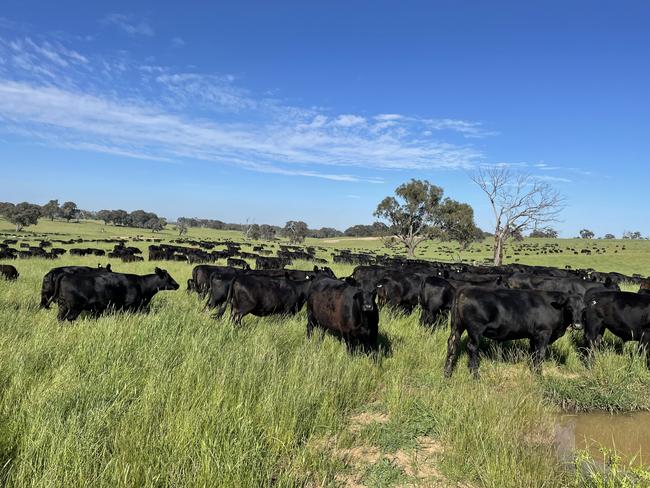Whitney Pastoral Company: King family turns profit with holistic beef model
A NSW cattle family has gone from breaking point to profits by using holistic management on their 3000ha historic property.

Following holistic management practices for 23 years has turned the King family’s run-down historic property into a productive and profitable business producing 30 per cent more grass, 30 per cent more stock and using four less labour units, all while improving environmental sustainability.
The 3038ha Coombing Park at Carcoar, in Central West NSW, dates back to 1826 with George and Melinda King taking the reins from George’s grandfather in 1996.
It is the only Cobb & Co property left that ownership still remains with its original descendants and it is a fact George is proud to declare given the economics did not initially stack up on their inheritance.
At one point the bank threatened to foreclose on the fifth-generation business.
“We didn’t have the financial ability to borrow against the asset anymore,” George said.
“It wasn’t generating enough income because the pastures were so degraded and the livestock enterprises were unproductive. Just from necessity we needed to do up the business without working capital. We had to do it on a shoestring.”

KICKSTARTING CHANGE
George, a Marcus Oldham graduate, said it was clear their farm management practices had to change. Fences were in disrepair, water “wasn’t good” and employing five permanent staff was not sustainable.
First up, the Merino sheep and Shorthorn stud were replaced with a small nucleus of Angus cattle. Electric fences and small portable yards were used initially to help get the economic wheels turning.
George also undertook a holistic management course, kickstarting his passion for regenerative farming and setting triple bottom line goals for Coombing Park.
“Our key to a viable operation is the triple bottom line and focusing on that,” George said.
“It’s not going to be viable if one of those legs – environment, economic, social – is not strong. The pot will fall over. You have to keep all three sides going.”
It was with those three goals in mind – to maintain environmental, economic and social sustainability – that the property and business began to transform and flourish.
“We started by keeping ground cover on the property,” George said.
“The soil is a living organism. Like if you lose too much skin you’ll die. The soil’s skin is the ground cover. Once you expose bare soil it will be cold at night and boiling hot during the day and exposed to massive extremes of temperature. You have to protect the soil. Keep the skin on it or it will die.”
Cattle were run in one big mob and moved once a week in a planned grazing system, not rotational.
“You don’t want to graze the same area at the same time each year,” George said.
“We swap them around because if you graze the paddock at the same time each year you’d be selecting for an unintended consequence. You would end up with a monoculture in it and you want a very biodiverse culture. It needs to be erratic because nature is erratic.”

DROUGHT RELIEF
The Kings avoid using chemical fertilisers to protect the soil microbes that help with mineral cycling, nutrients and water-holding capacity in the soil.
“All you need to do to start building soil and building carbon is to keep the ground cover on,” George said.
“Then manage it via stocking rate to carrying capacity. We know how much grass we can grow for 100mm of rain so we match carrying capacity with stocking rate and it means we are never really in a drought.”
The technique has improved water-holding capacity on the property immensely from the Kings struggling through their first major drought in 2006 to sailing through in 2017 to 2019.
“We had 60 per cent numbers on and even managed to do a couple of trades. When the country is rested the grass is right to go. We had a couple of lucky storms so we could grow grass in a drought,” George said.
“We can’t control how much rain we get on the property but we have huge control over effective rainfall. If you have bare ground it will run off. If we have good ground cover, it will mostly soak in.
“It’s a long slow process to get to that point. A long slow haul. But once the correct management is in place, the soil quality just keeps increasing forever. It just keeps getting better.”
REDUCING THE RISK
The Kings, trading as The Whitney Pastoral Co, built the herd up to 2000 cows and initially sold calves to the weaner market for 15 years.
Now that the property has improved, so have the Kings’ market options. They now have more control over when and where they sell cattle, avoiding “the whim of the weaner markets”.
All progeny are taken through to feeder weights and sold to JBS Riverina at 18 months between 400kg and 500kg.
They have built numbers up since the drought and currently join 1500 cows a year, turning off 700 steers, predominantly Karoo bloodlines. About 300 heifers are retained as replacements each year with any excess sold through the onfarm.co platform.
George estimates with planned grazing they run 30 per cent more stock than with conventional set stocking and can grow 30 per cent more grass. Feed budgets help determine critical dates six months ahead.
“It is so rational and easy to manage,” he said.
“In these good seasons we have 3700 head on and still me as the only permanent labour unit.

Cattle are only through the yards twice a year. It is a really simple business model. Low cost, low input.
“In a conventional system if you are getting into a tough season with tough prices you have no control whereas we have the ability to control our costs.
“All our pastures are growing on their own. We don’t need to maintain them. Drench bills are down because we don’t have the worm burden. We get more growth through the season and the droughts are less severe because our soil carbon levels are up.”
Pastures are perennial with a phalaris base but include clover, chicory and lucerne, which has a good root structure to help sustain through drought.
George said by resting country their grazing area multiplied and bounced back quicker, allowing them to capitalise on markets earlier.
THE WEAKEST LINK
As part of the Kings’ holistic management approach, all inputs are discretionary and addressed only if it is the weakest link.
“Holistic management modules give you a really clear model of how to address your weakest link and where to spend money,” George said.
“Some years it might be to fix your kitchen up, which has nothing to do with the farm but it is part of the social side of it and it all has to be sustainable in the triple bottom line.”

The whole business model is based around being simple.
“It’s easy to manage. I’m less stressed. You are more in control of your business,” George said.
“The kids get to see me enjoying farming. Two of my boys want to be farmers. It makes the family business sustainable.”
In terms of production, the Kings aim for as much profit as possible without sacrificing environmental or social outcomes.
“It’s about everything being in balance,” George said.
“We don’t do benchmarking with anyone as we are just doing the best we can. Our main competitor is who we were last year.”
Before the change in management style, the Kings were losing equity each year with the worst loss between 4 and 5 per cent.
“We return positive returns now which seem to be sustainable throughout droughts,” George said.




